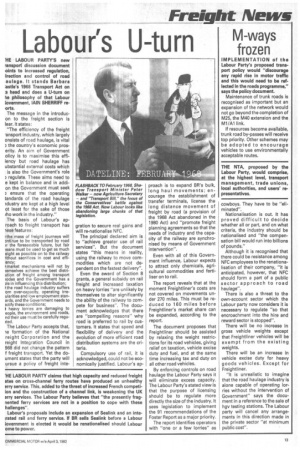Labour's U-turn
Page 7

If you've noticed an error in this article please click here to report it so we can fix it.
HE LABOUR PARTY'S new ranspori discussion document eints to increased regulation, lirection and control of road aulage. It stands Barbara ;astle's 1968 Transport Act on head and does a U-turn on he philosophy of that Labour iovernment, LAIN SHERRIFF reeds.
The message in the introducon to the freight section is lear. It states:
"The efficiency of the freight .ansport industry, which largely onsists of road haulage, is vital ) the country's economic pros
erity. An aim of Government &icy is to maximise this effi iency but road haulage has ubstantial external costs which is also the Government's role ) regulate. These aims need to e kept in balance and in addion the Government must seek ) ensure that the operating tandards of the road haulage idustry are kept at a high level ot least for the sake of those rho work in the industry."
The basis of Labour's aproach to freight transport has )ese features:
1 the mass of freight journeys will 3ntime to be transported by road )1, the foreseeable future, but fair leans must be used to get as much eight as possible on to the railway ithout sacrifices in cost and effiency; market mechanisms will not by lemselves achieve the best distriution of freight among transport lodes and the Government has a )le in influencing this distribution; I the road haulage industry suffers .om over-capacity, operating irreularities and low employment stena rds, and the Government needs to 3ctify these conditions;
k heavy lorries are damaging to eople, the environment and roads, nd their use must be carefully regu)ted.
The Labour Party accepts that, le formation of the National reight Corporation and the reight Integration Council in 968 did not change the pattern f freight transport. Yet the doument states that the party will ursue a policy of freight inte gration to secure real gains and will re-nationalise NFC.
The principal declared aim is to "achieve greater use of rail services". But the document states "this means in reality, using the railway to move commodities which are not dependent on the fastest delivery".
Even the award of Section 8 grants, a general subsidy on rail freight and increased taxation on heavy lorries "are unlikely by themselves to alter significantly the ability of the railway to compete for business". The document acknowledges that there are "compelling reasons" why road is preferred to rail by customers. It states that speed and flexibility of delivery and the evolution of more efficient road distribution systems are the criteria.
Compulsory use of rail, it is acknowledged, could not be economically justified. Labour's ap
proach is to expand BR's bulk, long haul movements; encourage the establishment of transfer terminals, license the long distance movement of freight by road (a provision of the 1968 Act abandoned in the 1980 Act) and "promote freight planning agreements so that the needs of industry and the capacity of the railway are synchronised by means of Government intervention".
Even with all of this Government influence, Labour expects to attract only chemicals, agricultural commodities and fertiliser on to rail.
The report reveals that at the moment Freightliner's costs are not covered on movements under 270 miles. This must be reduced to 160 miles before Freightliner's market share can be expanded, according to the report.
The document proposes that Freightliner should be assisted by relaxing the weight restrictions for its road vehicles, giving relief on taxation, vehicle excise duty and fuel, and at the same time increasing tax and duty on all other road vehicles.
By enforcing controls on road haulage the Labour Party says it will eliminate excess capacity. The Labour Party's stated view is that the purpose of licensing should be to regulate more directly the size of the industry. It sees legislation to implement the 91 recommendations of the Foster Report as a major priority.
The report identifies operators with "one or a few lorries" as cowboys. They have to be "eliminated".
Nationalisation is out. It has proved difficult to decide whether all or part, and on what criteria, the industry should be nationalised and "the compensation bill would run into billions of pounds."
Although it is recognised that there could be resistance among NFC employees to the renationalisation of their company, "it is anticipated, however, that NFC should form a part of a public sector approach to road haulage".
There is also a threat to the own-account sector which the Labour party now considers it is necessary to regulate "so that encroachment into the hire and reward sector is stopped".
There will be no increase in gross vehicle weights except that Freightliner vehicles will be exempt from the existing weights.
There will be an increase in vehicle excise duty for heavy goods vehicles. Except for Freightliner.
"It is unrealistic to imagine that the road haulage industry is alone capable of operating lorries without the intervention of Government" says the document in a reference to the sale of hgv testing stations. The Labour party will cancel any arrangements in this direction made in the private sector "at minimum public cost".


















































